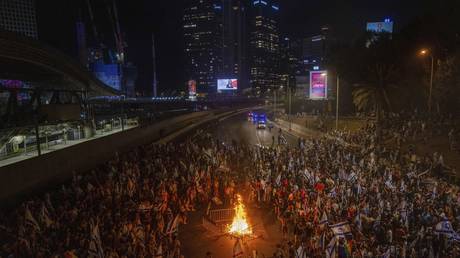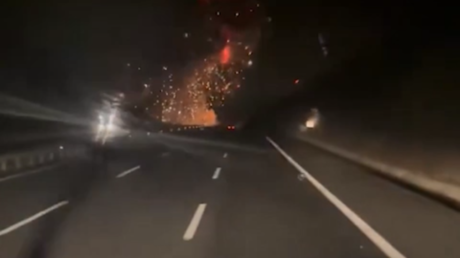
Prime Minister Benjamin Netanyahu’s judicial reforms have driven some citizens to consider leaving the country, the survey found
Some 56% of Israelis fear that their nation may descend into civil war amid nationwide protests over new legislation limiting the power of the country’s supreme court, a poll published on Wednesday has found. Israeli President Isaac Herzog previously warned that the legal upheaval could cause bloodshed.
Israel’s parliament passed the first part of Netanyahu’s reform package on Monday, restricting the court’s oversight of government actions and limiting its ability to veto political decisions and appointments. While the PM claimed that the overhaul was necessary to rein in an overpowered judiciary, opposition leaders argued that the move threatened Israel’s democracy itself.
Demonstrations broke out in multiple cities after the law was passed, with protesters and riot police clashing in Tel Aviv and Jerusalem. In the town of Kfar Saba, situated north of Tel Aviv, three people were injured after a driver plowed his car through a group of protesters blocking a highway.
According to a survey carried out by Israel’s Channel 13 on Tuesday, 56% of respondents feared the outbreak of civil war. With more than 10,000 military reservists refusing to serve in protest, and nuclear scientists threatening to quit, 54% of respondents said that the reforms threatened Israel’s national security.
The poll also found that 28% of respondents were weighing a move abroad.
Netanyahu has vowed to hold talks with opposition leaders Benny Gantz and Yair Lapid on the remainder of his proposed reforms, and insists that he is open to compromise. Only 33% of respondents said that they believed the prime minister, but 55% nevertheless called on Gantz and Lapid to return to negotiations with Netanyahu.
Gantz has promised that if his centrist National Unity party comes to power, he will undo Netanyahu’s reforms in their entirety.
Israel was rocked by protests and strikes from the announcement of the reforms in January until March, when Netanyahu agreed to put them on hold and negotiate with opposition parties. During the most intense demonstrations in mid-March, Israeli President Isaac Herzog publicly called on Netanyahu to accept a watered-down set of changes, warning that “a real civil war” was “within touching distance.”




